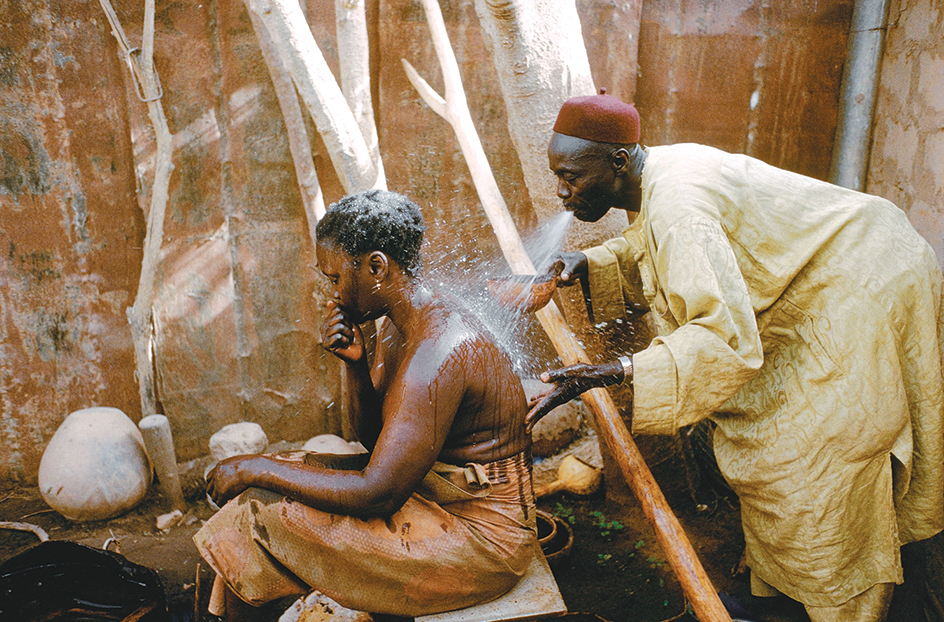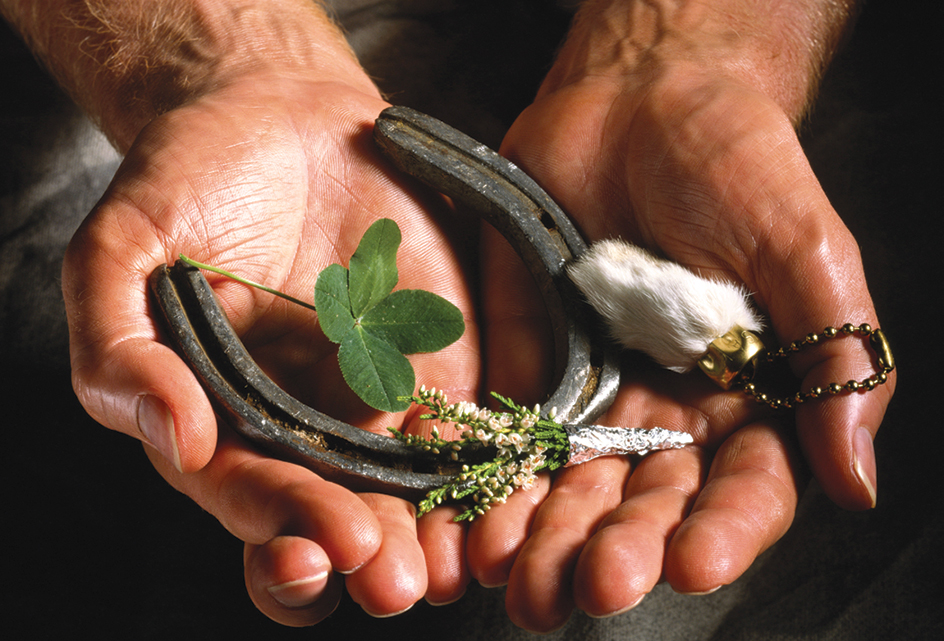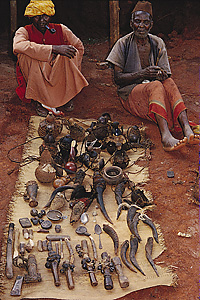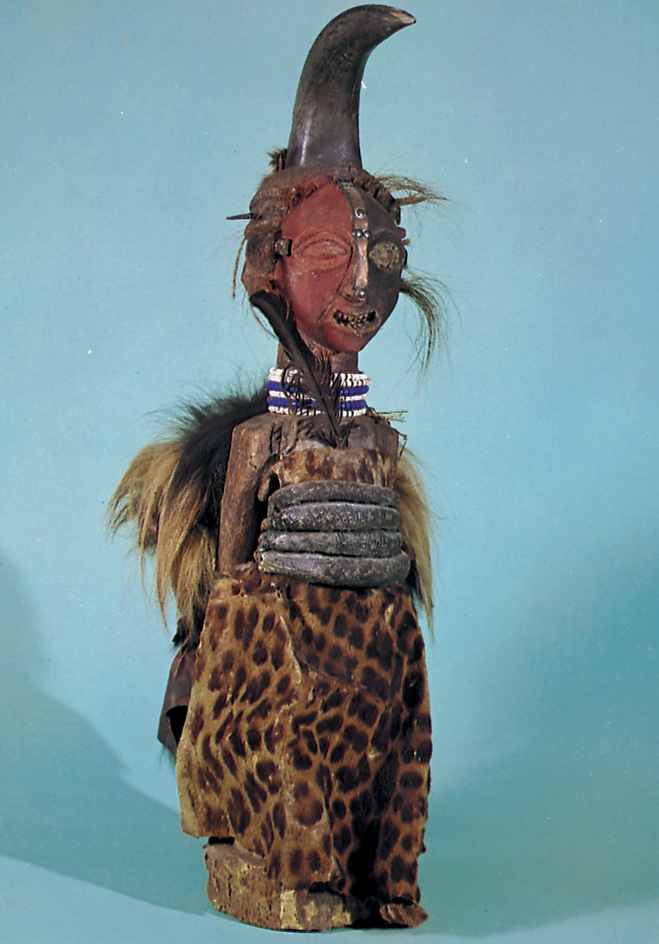Magic is the supposed use of supernatural power by a person to control human actions or natural events. The term supernatural describes actions that work through forces that seem to have no scientifically established existence. Science examines the cause and effect of events in nature. As scientists learn more about the natural world, some things that were once thought to be magic are now understood as natural.
Traditionally, anthropologists and other scholars have compared magic with religion because both involve the supernatural. They observed that in magic, a person manipulates supernatural power directly to achieve a goal. Scholars saw this as different from religion, where believers asked their god or gods to manipulate power on their behalf. Within many societies, the terms religion and magic are sometimes used to distinguish between what people consider as right and wrong ways to use supernatural force. Followers of a religion may accuse other religions of practicing magic. For example, as Christianity was emerging during the Roman Empire, different Christian sects competed for influence and attention. Individual groups often accused competing groups of practicing magic. In European and American society, people have associated magic with witchcraft or sorcery, which are usually seen as evil.
The word magic also refers to entertainment in which the performer does tricks of so-called magic. In such entertainment, neither the magicians nor the audience believes that the performer has supernatural powers. For information on magical performances, see Magician.
Elements of magic
The practice of magic often includes special words, actions, and objects. A person who performs magic is called a magician, and the performance of the actions, with words and objects, is called a ritual.
Magical words.
The magical power of the ritual is often thought to lie in the spoken words. Often, magical words are thought to call some entity into existence by naming it, or to command some spirit to act for the speaker by naming the spirit. In some societies, names are thought to have special power, and people are extremely careful about who knows their true name. When words are used to achieve some specific end—for example, to heal someone of illness—the ritual is called a spell or incantation. When the words are used to call a spirit, the ritual is called an invocation. In some societies, people think that the magical words must be spoken in a certain order to have effect.

Magical actions.
Often, the magician will perform actions in addition to the words. Sometimes these actions imitate the goal of the ritual, such as sprinkling water on the ground to make the rain fall. Sometimes the magician uses a certain magical action to gain knowledge that cannot be known by ordinary means. This action is called divination. In divination, a person called a diviner uses certain objects to foretell the future or to explain the unknown. For example, some diviners use tarot cards to predict the future. Among the Azande of Sudan, diviners sometimes feed a poisonous magical substance to a chicken and ask a question, such as whether it is a good day to travel. The answer to the question, either yes or no, depends on whether the chicken lives or dies.
Magical objects
are plants, crystals, stones, and other objects that are thought to have supernatural power. Objects that are specially prepared to protect their bearers are called amulets, charms, or talismans (see Amulet). Such objects may be combined with other magical items and items that come from their owner, such as hair, nail clippings, or personal possessions.

The magician.
In some societies, nearly everyone is thought to be capable of some magic. In others, magic is practiced by experts who are specially trained. They often learn their craft through apprenticeship under another expert. Such people are sometimes called shamans, witch doctors, sorcerers, medicine men or women, cunning men or women, and other names (see Shaman). Some societies believe that individuals must inherit their powers before they can learn to use them.

Kinds of magic
Many anthropologists classify magic as homeopathic or contagious, according to its basic principles. The Scottish anthropologist Sir James G. Frazer first described these types in his book The Golden Bough (1890).
Homeopathic magic
is based on the belief that like produces like. In this type of magic, also called imitative magic, magicians act out or imitate what they want to happen. They often use a model or miniature of whatever they want to influence. For example, a fisherman may make a model of a fish and pretend that he is netting it. That magical ritual would have the goal of ensuring that he gets a good catch. In some European folk dances, the dancers leap high into the air to make their crops grow tall. People once believed that a yellow flower would cure jaundice, a yellowish discoloration of the body.
A taboo is a type of rule that seems to have its origins in magic. Many taboos have roots in homeopathic magic. People avoid certain harmless things because they resemble harmful things. Among the Inuit people of the Arctic, for example, parents have traditionally warned their sons against playing a string game, such as cat’s cradle, in which children loop string around their fingers. They feared that playing such games might cause the children’s fingers to become tangled in the harpoon lines they will use as adults.
Contagious magic
comes from the belief that after a person has contact with certain things, those things will continue to influence that person. Examples of contagious magic often involve parts of the body, such as fingernails and hair. These were thought to affect that person’s body long after they have been cut off. The use of a “voodoo doll” is one example of contagious magic. The magician makes a doll or some other likeness of an enemy. The doll usually includes a lock of hair or some other personal object from the victim to give it power. People think that the magician can then harm this enemy by sticking pins in the doll or injuring it in other ways.
Magic throughout the world
People who practice magic are found in every society and throughout history. However, the way that people have understood and carried out magical practices has varied widely.
Ancient times.
The use of magic goes back thousands of years. Scientists believe that much prehistoric art had magical purposes. Hunters, for example, may have used cave paintings of animals in rituals intended to help them hunt the animals.
Magic was important to the ancient Egyptians, who used amulets, figures, and other objects. The ancient Greeks and Romans tried to tell the future from dreams. They also consulted priests and priestesses called oracles, who interpreted advice from the gods (see Oracle).
Europe.
Through the years, European thinkers did not always make clear distinctions between magic, science, and philosophy. Many European scientists, including Isaac Newton of England and Johannes Kepler of Germany, explored matters that would be considered magic today. Some historians believe that interest in magic was an important part of the scientific revolution, a period beginning in the 1500’s when scholars realized the importance of experimentation and mathematics to scientific advances. Many magical theories of the time held that human beings could affect the world directly if they understood it correctly. See Science (The scientific revolution).
European scholars wrote philosophical manuscripts that interwove ideas and observations about the soul, astrology, astronomy, and physics. European scholars of the time believed that different worlds existed—the material world inhabited by human beings; the celestial world of the sun, moon, stars, and planets; and the divine world of God, the angels, and the saints. These different worlds could affect each other in mysterious ways. These scholars believed that people could draw the magical power of other worlds into the material world by manipulating the symbols of the celestial or divine.
One way in which people tried to draw on the magical power of other worlds was through alchemy. This blend of magic, mystical philosophy, and experimentation with various substances helped the science of chemistry develop. Alchemists believed that it was possible to turn lead into gold by writing down astrological and religious symbols in particular ways. European alchemists spent much time trying to determine the correct combinations of symbols to produce gold, without success.
Africa and the Americas.
Some people in Brazil and areas of the Caribbean practice a group of related religions that use magic. These religious traditions originated among the Yoruba and related peoples of West Africa, who arrived in the Americas through the Atlantic slave trade. The most common forms of these religions in the Americas are known as Vodou (sometimes called Voodoo), Santeria, Macumba, and Candomble. In Africa, they are commonly referred to as African traditional religions. People who practice these religions believe that the spirits of ancestors, relatives who have died, and other supernatural spirits can affect the living. At times, these spirits may possess individuals by entering the person’s body. People who have been possessed often report that they were not aware of themselves and have no memory for what they said or did in the possessed state.
Among these religions, certain experts are able to give magical power to charms, herbal preparations, candles, and other items. People may purchase these objects to help them recover from illness, improve their job situation, solve family problems, or otherwise enlist the aid of the spirits.

Asia.
Many societies in Asia have traditions that involve magic. Among villages of Malaysia, for example, a bomoh provides cures for illness through magic. In Indonesia, the person who performs this kind of function is called a dukun. If there is an unexplained illness and witchcraft is suspected, the bomoh will try to find the magic cause. A bomoh or dukun may be a man or a woman. Bomohs use herbs and chants to cure illness and do other work that in other countries is done by doctors. A bomoh or dukun also may be consulted to explain dreams, provide magic charms, and even try to catch thieves or help lovers win the hearts of their beloved.
Modern magic.
Today, many people in Europe and the United States practice religions that focus on magic. These religions include modern witchcraft, called Wicca; modern Druidism; and the Western Mysteries. Often, the symbols and names they use are borrowed from the myths and traditions of the ancient Greeks, Egyptians, Celts, and the Nordic and Native American peoples. These modern groups believe that there is a magical power in nature that can be concentrated and directed by human beings.
Members of modern religions based on magic often meet in groups called covens on the night of a full moon or on other special dates. They may perform rituals and cast spells using the names and symbols of ancient gods. Rituals often focus on the change of seasons, drawing on ancient seasonal rituals of the past. Modern spells are often created from a combination of elements from ancient religious traditions and modern invented practices. Such mixing of old and new traditions is called syncretism.
